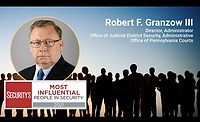Looking back at his life, Fred Burton says his father instilled within him the very values he holds dear today, including a commitment to service and a wish to make a difference. “My dad gave me a better start in life than he ever had and instilled in me a sense of duty and service. He truly believed that you could make a difference. I’m not sure how much difference I have made in my career, but I’ve certainly tried,” he says.
Burton began his career in law enforcement for the U.S. Secret Service and later worked as a police officer in Montgomery County, Md. From 1985 to 1999, he was a special agent with the U.S. Diplomatic Security Service (DSS) and was eventually promoted to the Deputy Chief of the DSS Counterterrorism and Protective Intelligence Division.
During this time, he served on the frontlines of several global terrorism investigations, including the hunt for Ramzi Yousef, who was behind the first World Trade Center bombing in 1993; the 1998 plane crash of PAK-1 that killed U.S. Ambassador Arnold Raphel and Pakistani President Muhammad Zia-ul-Haq; the search for Americans kidnapped by Hezbollah in Beirut, Lebanon; the kidnapping and murder of CIA station chief William Buckley; and countless other terrorist attacks and threats around the globe.
Burton helped develop the State Department’s Rewards for Justice Program, which seeks to thwart acts of terror and stop terrorists like Yousef and Osama Bin Laden. He was part of the original team that built the Protective Intelligence Division at the State Department.
He has positively impacted the security and intelligence world and is often referred to as the “Father of Protective Intelligence” for developing a framework for the approach and infrastructure of protective intelligence, helping to change the process for how physical security threats are identified and assessed for government, corporate and executive entities.
Of this, he says, “After studying and investigating countless attacks early on in my career, I’m proud of the Protective Intelligence program we built at the State Department in the 1980s, which still exists today. I understand that I was the first to transition the protective intelligence model into the private sector in the late 1990s. The model has since become the gold standard and set the best practices for the private sector.”
In 2004, Burton joined Stratfor – an Austin, Texas-based geopolitical intelligence platform provider – as Chief Security Officer and Vice President of Intelligence. There, Burton oversaw Stratfor’s analysis of global security developments, developing and consulting with clients on security-related issues affecting their business, assets or personal safety, and guiding coverage of situations involving terrorism, hostages, hijackings and plane crashes.
Now, one of the world’s foremost authorities on protective intelligence, security and counterterrorism, Burton is Executive Director of the Ontic Center for Protective Intelligence. At Ontic, he spearheads strategic consulting to physical security leaders at major corporations, advising how to optimize security programs, streamline protective intelligence initiatives and keep people safe.
As Executive Director, Burton helped create and launch the Ontic Center for Protective Intelligence. The center was established to share best practices, insights on current and historical trends, and lessons learned from physical security peers and industry experts. Under his leadership, the group provides strategic consulting, multidimensional services and resources for safety and security, legal, risk and compliance professionals at major corporations. Burton has been instrumental in helping many corporations transform their approach to proactively address physical threat management and protect employees, assets and customers.
Throughout his career, Burton says he has often returned to the following advice. “Follow your dreams. Most people give up before they get there. Make sure to network in the industry and find great mentors. Self-educate on topics to make yourself better, and don’t be afraid to ask for help.”
Burton is a New York Times best-selling author of four books, include a personal memoir: “GHOST: Confessions of a Counterterrorism Agent,” “Chasing Shadows: A Special Agent’s Lifelong Hunt to Bring a Cold War Assassin to Justice,” “Under Fire: The Untold Story of the Attack in Benghazi” and “Beirut Rules: The Murder of a CIA Station Chief and Hezbollah’s War Against America.”
In addition to leading within the security industry, Burton is an active member in several councils and committees, including the Bethesda-Chevy Chase Rescue Squad (Life Member since 1975), the Greater Austin Crime Commission, the Austin Fire Foundation and an Advisory Board Member at ALTR. Previously, he served as Assistant Director of the Texas Department of Public Safety, on the Texas Border Security Council and the National Police Foundation’s Center for Mass Violence Response Studies (CMVRS).
Recognized as a renowned expert in counterterrorism and security, Burton has provided context, analysis and security insights for multiple documentaries, television series, news, programs and several high-profile events and organizations. He also hosts the Protective Intelligence podcast, where he frequently speaks with experts about real-life incidents, ranging from the 1966 University of Texas shooting to high-profile kidnappings and workplace violence incidents.
To go back to the main article for Security’s Most Influential 2021, click here.



